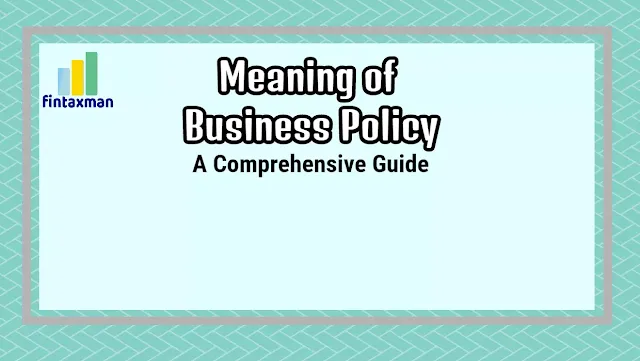Introduction to Business Policy
In today’s dynamic business environment, organizations are navigating rapid changes driven by globalization, emerging technologies, shifting socio-demographic trends, and unpredictable political conditions. These factors have rendered traditional approaches to policy-making outdated, leading to an evolution in the study of business policy, which is now often integrated with strategic management programs.
Meaning of Business Policy
Definition of Business policy
- Christensen, Steiner and others, “The study of the function and responsibilities of senior management, the crucial problems that affect success in the total enterprise, and the decisions that determine the direction of the organisation and shape its future.”
- Henry Mintzberg, “Policy refers to goal-directed decisions and actions in which capabilities and resources are matched with the opportunities and threats in the environment. Policy and Strategy are consistent stream of decisions and actions to deal with the environment.”
- R. E. Thomas, “Business Policy basically deals with decisions regarding the future of an ongoing enterprise. Such policy decisions are taken at the top level after carefully evaluating the organisational strengths and weaknesses in relation to its environment.”
Features of Business Policy
- Specific - Policy should be specific and definite. If it is uncertain, then the implementation will become difficult.
- Clear - Policy must be unambiguous. It should avoid use of jargons and connotations. There should be no misunderstandings in following the policy.
- Reliable/Uniform - Policy must be uniform enough so that it can be efficiently followed by the subordinates.
- Appropriate - Policy should be appropriate to the present organizational goal.
- Simple - A policy should be simple and easily understood by all in the organization.
- Inclusive/Comprehensive - In order to have a wide scope, a policy must be comprehensive.
- Flexible - Policy should be flexible in operation/application. This does not imply that a policy should be altered always, but it should be wide in scope so as to ensure that the line managers use them in repetitive/routine scenarios.
- Stable - Policy should be stable else it will lead to indecisiveness and uncertainty in minds of those who look into it for guidance.
Objectives of Business Policy
- In Terms of Knowledge – The Various concepts like Strategy, Policy, Plans and Programmes are encountered in the functional area course too. It is imperative to understand these concepts specifically in the business policy. Through all these tool Learner can understand the environment in which firms operates. The development of such approach helps in problem solving and decision making for Business.
- Skills – Attainment of knowledge should lead to skills in order to apply hat has been learnt. This can be taken place by an analysis and interpretation of case studies as well as business events to develop skill of identifying the factors relevant in decision making. Analysis of SWOT and suggestion of appropriate strategies and policies of core content of general management decision making.
- Attitude - Inculcation of appropriate attitude amongst Learner. Function under partial ignorance conditions. In long range planning especially, the manager has to make do with incomplete information.
Purpose of Business Policy
- To integrate the knowledge gained in various functional areas of management
- Adopt a generalist approach to solving problems
- Understand the complex interlink ages operating within the organization. Through the use of system approach to decision making and relating these chances taking places in the external environment.
Importance of business Policy
- Learning – business policy to integrate the knowledge and experience gained in various functional areas of management. It enabled the learner to understand and make sense of the complex interaction between different functional areas.
- Business Environment - business policy helps to make the study and practice of management more meaningful as one can view business decision making in its proper perspective. Short terms gain for department may be sacrificed in the interest of the long-term benefits that may accrue to organization as a whole.
- Understanding the Organization – business policy helps to create an understanding of how policies are formulated. Its helps to creating an appreciation of the complexities of the environment that are faced by senior management.
- Personal Development – beneficial for an executive to understand the impact of policy shifts on the status of one’s department and the position one occupies. Understanding of business policy enables executive opportunity or avoids a risk with regard to career planning and development.
Difference between Policy and Strategy
- Policy is a blueprint of the organizational activities which are repetitive/routine in nature. While strategy is concerned with those organizational decisions which have not been dealt/faced before in same form.
- Policy formulation is responsibility of top-level management. While strategy formulation is basically done by middle level management.
- Policy deals with routine/daily activities essential for effective and efficient running of an organization. While strategy deals with strategic decisions.
- Policy is concerned with both thought and actions. While strategy is concerned mostly with action.
- A policy is what is, or what is not done. While a strategy is the methodology used to achieve a target as prescribed by a policy.
FAQ's
Define Business Policy?
It is aggregate of the policy guidelines of different functional areas viz. production, marketing, finance etc in a company. It is the major policy guidelines drawn by the board of director to regulate the overall direction in which company should move, in simple words it is the process of study process of decision and process of action leading to development of effective business strategy.
Evolution based on managerial practices?
Guleck has viewed the development in business policy as arising from the use of planning techniques by mangers. Starting from day-to-day planning in earlier times managers till recently tried to anticipate the future through the preparation of budgets and by using control management by objectives. However, as these techniques were unable to emphasis planning came into use.





0 Comments